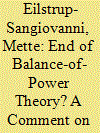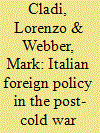| Srl | Item |
| 1 |
ID:
088561


|
|
|
|
|
| Publication |
2009.
|
| Summary/Abstract |
The balance of power is one of the oldest and most venerable concepts in the study of International Relations. Few concepts have had a comparable influence on both scholarship and statesmanship, and few have been so fiercely contested. In a recent article, `Testing Balance-of-Power Theory in World History' (EJIR, June 2007), Wohlforth et al. set out to test balance-of-power theory against 2000 years of world history. Although their article has considerable merits, I highlight three main weaknesses in their approach. First, I argue that they misstate balance-of-power theory. Second, the competing theoretical hypotheses they offer are (a) not novel, (b) too vague to enable productive empirical testing. Third, the historical evidence they present, based on the study of ancient international systems, is too scant and impressionistic to be probative for the causal mechanisms they seek to evaluate. As a result, balance-of-power theory is neither refuted nor significantly refined.
|
|
|
|
|
|
|
|
|
|
|
|
|
|
|
|
| 2 |
ID:
108661


|
|
|
|
|
| Publication |
2011.
|
| Summary/Abstract |
Drawing on a neoclassical realist approach, this article analyses the foreign policy conduct of different Italian governments from 1994 to 2008. Pressured by the post-cold war international system, these governments have been compelled to raise Italy's profile within the international system. However, the way in which successive governments have responded has differed markedly. By looking at variables located at the domestic level - elite perceptions of the distribution of power and government instability - it is possible to explain these differences. Neo-classical realism is seen as an advance on Waltzian neo-realism precisely because it allows room for domestic as well as international (or systemic) variables, and because it has a very specific focus on foreign policy as such.
|
|
|
|
|
|
|
|
|
|
|
|
|
|
|
|
| 3 |
ID:
113814


|
|
|
|
|
| Publication |
2012.
|
| Summary/Abstract |
This paper tests the explanatory power of the main strands of neoclassical realism in accounting for US foreign policy after the Cold War. According to the emphasis they place on the relevance of structural versus non-structural variables in foreign policy making, three schools can be identified. The first school restricts the role of non-structural factors to accounting for anomalous behavior; the second school argues that non-structural variables should also be included in order to understand the policy's timing and style, and, in times of security plenty, its content; while the third school contends that it is international structural factors, i.e. a state's strategic interactions with other polities, that shape most foreign policy. Following the test of their forecasts versus the historical record, the third school emerges as providing the most accurate account and as the most promising avenue of research for neoclassical realism.
|
|
|
|
|
|
|
|
|
|
|
|
|
|
|
|
| 4 |
ID:
112791


|
|
|
|
|
| Publication |
2012.
|
| Summary/Abstract |
This essay presents the argument that analysts, crystal ball readers and general future-tellers generally should to a much higher extent rely on claimed interests of great powers than on resources alone in predictions of future behaviour of great powers. Analysts should analyse what states want to do given what they could do, as much as analyse what states could do based on their resources, or analysts should analyse state policy intentions as much as state policy resources.
|
|
|
|
|
|
|
|
|
|
|
|
|
|
|
|